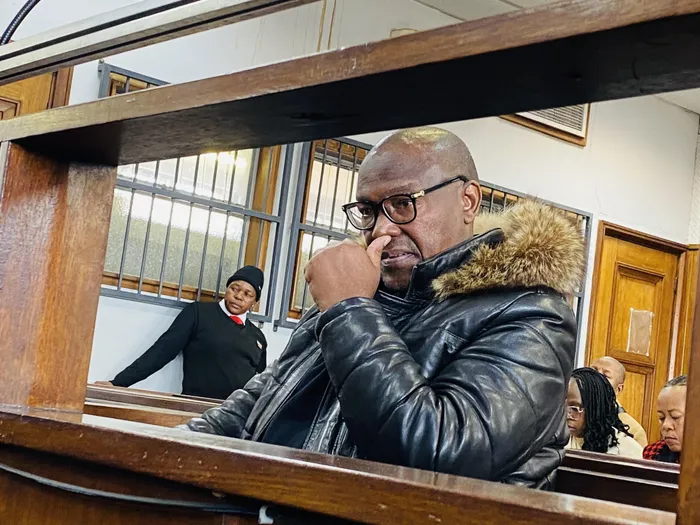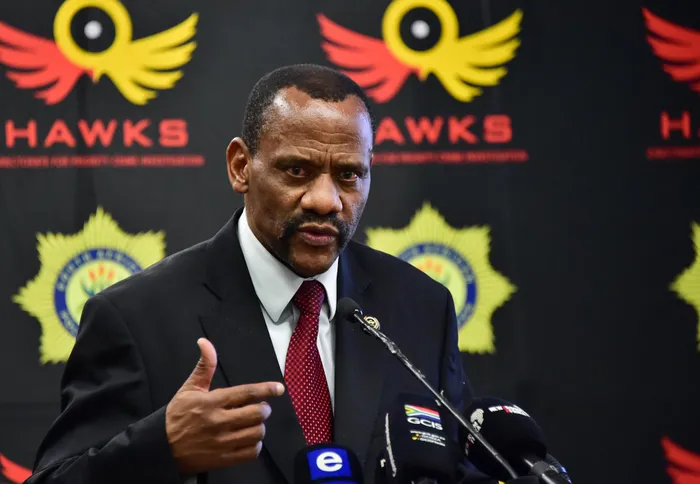Power, Proximity, and the Crisis in South Africa's Law Enforcement

Accused mastermind Katiso Molefe appears in the Alexandra Magistrates’ Court amid allegations linking him to the murders of DJs and drug-related killings across Gauteng.
Image: Simon Majadibodu/IOL
Clyde N. S. Ramalaine
South Africa’s criminal justice system is buckling under the weight of unfolding revelations and mounting drama, this time drawing the spotlight to colourful businessman, self-styled philanthropist, and consultant Malcolm X.
Former Hawks boss, General Godfrey Lebeya, and the controversial arrest of KT Molefe initially introduced an unnamed source who had made a critical phone call. That individual has since self-identified as Malcolm X. Molefe stands accused of orchestrating a series of killings, including those of Armand Swart and DJ Sumbody.
What began as a forceful exposé by KZN Provincial Commissioner Lt. General Nhlanhla Mkhwanazi has now spiralled into a case study of influence, access, and institutional compromise. At the heart of this saga lies not just the veracity of claims but the structural rot revealed through a cast of characters who blur the lines between private interest and public power.
Into this ever-unfolding crisis emerges businessman Malcolm X, now in self-disclosure at the centre of a growing controversy following allegations that he contacted former Hawks boss General Godfrey Lebeya to confirm whether officers from the elite unit had been dispatched to the home of KT Molefe.
Before emerging as a high-profile businessman, Malcolm X was introduced to South African public discourse against the backdrop of his turbulent years as a student at the University of the Witwatersrand (Wits).
At Wits, he gained attention for his charismatic presence, populist rhetoric, and penchant for controversy. Though he initially showed promise, his student years were marked by personal instability, culminating in a reported attempted suicide, perhaps underscoring the psychological strain of navigating university life and complex social expectations.
His later descent into more precarious criminal territory became evident when he was arrested alongside several police officers under murky circumstances involving abuse of power and alleged impersonation. On 23 October 2023, Malcolm X was arrested alongside three police officers on charges of corruption and extortion.
They are accused of coercing a woman by threatening to arrest her and her son to pay R580,000 to avoid detention for purportedly forged passport stamps. Malcolm X is alleged to have acted as the middleman facilitating the bribe. The Hawks’ Serious Corruption Unit arrested them following a joint investigation with the National Prosecuting Authority. The case, currently before the courts, was last postponed in July 2024, with Malcolm X out on bail.
News24, on Friday, broke the story that a warrant of arrest had been issued against Malcolm X for failing to appear in court for the ongoing extortion trial scheduled for August 1, after he reportedly fell ill. This development casts further shadow on his credibility and amplifies the gravity of his involvement.
While the principle of “innocent until proven guilty” remains a foundational pillar of any just society, and must rightly apply to Malcolm X, his arrest nonetheless exposes troubling dynamics within South Africa’s governance and policing spheres.
That an individual facing such serious allegations could simultaneously maintain access to the upper echelons of law enforcement and political elites forces a reckoning with how proximity to power can erode ideals of impartiality and accountability. This is not a judgment of guilt, but a reflection on the architecture of influence and the uncomfortable entanglement of those entrusted with public service.
Institutional authority increasingly appears to be governed less by merit and integrity than by informal networks, favouring economies, and a culture where access supersedes accountability. Regardless of the legal outcome, the plausibility of such access calls into question the integrity of systems meant to be impartial and reveals how fragile the boundary remains between protector and perpetrator.
What remains troubling and a cause for concern is how Malcolm X obtained direct access to the highest levels of the Directorate for Priority Crime Investigation (DPCI). According to Lebeya, Malcolm X was regarded as an informant based on prior interactions.
Malcolm X, however, categorically rejects this label, asserting that he met Lebeya only once, a meeting he claims to have documented with a photograph, which was also published in the ANG report. This contradiction introduces the first ambiguity surrounding his role and relationship with law enforcement.
Secondly, Malcolm X remains vague about the identity of the individual who contacted him to intervene. He describes the person only as a “longstanding client” for whom he offers unspecified “consulting services,” offering no clarity on the nature of these services or how they qualify him to insert himself into sensitive police matters. He inconsistently refers to the client as KT Molefe’s “brother” and later as a close “friend,” leaving the actual connection unclear. To explain the brother-friend conundrum, X resorts to philosophy in an attempt to deflect 702 anchor Manyatela’s direct question.
Thirdly, General Lebeya’s version adds further complexity. He confirms receiving a call from someone, now known to be Malcolm X, inquiring about the presence of Hawks officers at a residence, and that the caller described Molefe as a “friend.” Both Lebeya and X, however, vehemently deny any personal acquaintance with Molefe.
Despite this, X claims to have driven to Molefe’s residence after receiving the address from his client, where he reportedly encountered around 40 people and began questioning them about their affiliations. As for Lebeya, despite his knowledge of standard arrest procedures, which included the issuance of a warrant, he still chose to dispatch Hawks members to the scene. Why would Lebeya, a seasoned police officer and leader of the Hawks, engage in this? What compels him to be open to such action, especially given his familiarity with legal protocols?
This conduct raises serious legal and ethical questions: By what authority did Malcolm X believe he could interfere in a police operation, particularly one involving a person he claims not to know?
Fourthly, a report by Bianca Binase for Africa News Global notes: “Malcolm X insisted that Mkhwanazi must have known it was him (X) who had called Lebeya, because he (X) made a call to Lebeya and put him on speakerphone while the team Mkhwanazi had sent to effect the arrest were listening.”
X appears more than comfortable questioning on-duty officers about their directives. Why would he feel entitled to act this way? What informs his belief that he holds a rightful role in the arrest process, especially when he claims no connection to Molefe?

Former head of the Hawks Lieutenant-General Godfrey Lebeya.
Image: GCIS
Ordinarily, police effecting an arrest at a private residence do so under the authority of a duly issued warrant. The existence of such a warrant provides them with legal standing, regardless of who is involved. If such a warrant were in place, on what grounds did Malcolm X believe he could question the arrest or its legitimacy? Interfering in the execution of a lawful arrest, especially by a party not directly involved, can constitute a criminal offence.
A plausible explanation lies in Malcolm X’s perceived or actual access to General Lebeya. This relationship, if exercised casually, raises concerns about privilege, institutional credibility, and the politicisation of law enforcement.
In the fifth instance, Malcolm X admitted in an interview that he first tried to contact Minister Bheki Cele directly. When that failed, he called General Lebeya. This points to an extraordinary level of access to South Africa’s security hierarchy. Malcolm X downplayed this by claiming such individuals are “ordinary people” and thus accessible. Yet, this attempt to normalise access belies the larger implications.
Pressed by a 702 radio anchor about WhatsApp conversations between himself and Lebeya, Malcolm X insisted these had nothing to do with KT Molefe.
In the sixth instance, following Lebeya’s public remarks, Malcolm X contacted him again to question why his name had not been disclosed. Lebeya cited the Protection of Personal Information Act (POPIA), saying he needed Malcolm X’s consent. Malcolm X then attempted to reach Mkhwanazi to "correct" what he saw as a misrepresentation—that Mkhwanazi knew it was he who contacted Lebeya. However, it appears no direct conversation between them occurred.
Malcolm X later claimed that the idea of publicly naming himself as the caller originated with him and that he passed this suggestion to Kenny Kunene. He stated that he encouraged Kunene to break the story and identify him. Given Kunene’s media interests, including Weekly Xposé, Africa News 24-7 (now Africa News Global), it is plausible he would seize such a story.
Malcolm X’s insistence on being recognised as the person who called Lebeya, and his later frustration at not being publicly acknowledged, suggests a deeper psychological and political dynamic: the performance of proximity to power.
In South Africa, where access often masquerades as authority, Malcolm X seems to draw credibility from being seen as present and pivotal. His conduct points to a strategy of influence-as-performance, not merely to aid a legal process, but to establish indispensability. Being left unnamed is, for him, not protection but erasure.
While it may be premature to draw definitive conclusions, the possibility that Malcolm X is leveraging this controversy for personal or reputational gain cannot be dismissed. His repeated statements that he would “force his way” to testify before the Madlanga Commission suggest a fixation on visibility over accountability.
Lastly, one must ask: Why was General Lebeya so readily available to Malcolm X? What is the nature of their relationship if a single call could influence operations? If Malcolm X wields such influence, is it not likely that Molefe and his "client" were aware of it and sought to use it?
If so, the South African public must confront serious questions about the nexus between businesspeople, alleged criminals, law enforcement, political actors, and possibly even judicial elements. These opaque networks demand scrutiny.
Importantly, Malcolm X’s public self-disclosure does not undermine Lt. General Mkhwanazi’s central claim that someone contacted General Lebeya regarding the police presence at Molefe’s residence. That individual, as confirmed by Lebeya himself, was indeed Malcolm X. While the discrepancy concerning X’s status as an informant introduces interpretive ambiguity, it does not contradict the essential timeline.
Rather than discrediting Mkhwanazi, Malcolm X’s self-disclosure reinforces the troubling reality of police involvement in criminal networks and highlights the disturbing level of access that accused individuals have to the top brass of the police and the state.
This episode epitomises the murky intersection of political access, private influence, and public authority in South Africa. It reflects a dynamic that increasingly defines our legal and political terrain, one that urgently demands illumination rather than evasion.
The unfolding controversy involving Malcolm X and the Molefe arrest has done more than validate Mkhwanazi’s initial revelation; it has laid bare the extent to which access to state institutions can be wielded for opaque ends.
The credibility of South Africa’s law enforcement is undermined not merely by criminality, but by the normalisation of backdoor influence dressed as legitimacy. What is at stake is more than an individual’s innocence or guilt; it is the integrity of democratic accountability and the urgent need to interrogate the shadow networks that shape power behind the scenes.
* Clyde N.S. Ramalaine is a theologian, political analyst, lifelong social and economic justice activist, published author, poet, and freelance writer.
** The views expressed do not necessarily reflect the views of IOL, Independent Media or The African.